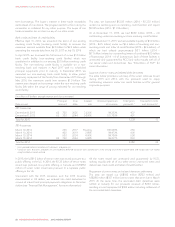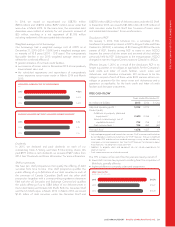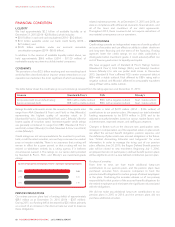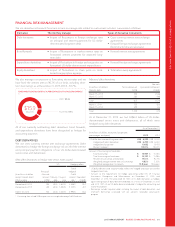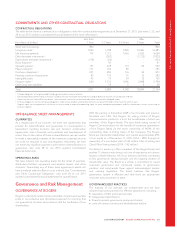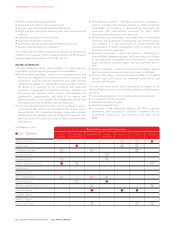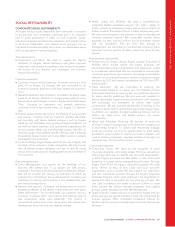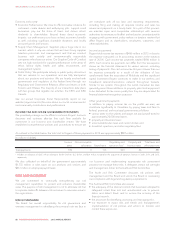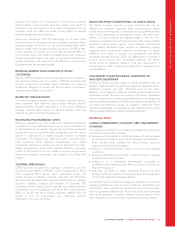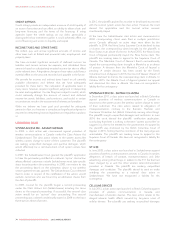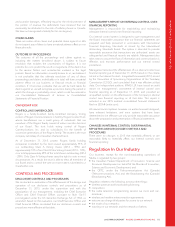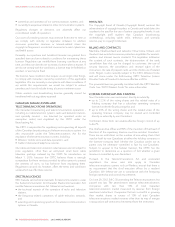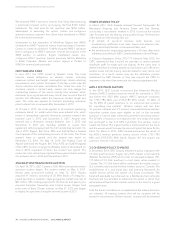Rogers 2015 Annual Report Download - page 70
Download and view the complete annual report
Please find page 70 of the 2015 Rogers annual report below. You can navigate through the pages in the report by either clicking on the pages listed below, or by using the keyword search tool below to find specific information within the annual report.
MANAGEMENT’S DISCUSSION AND ANALYSIS
Economy and society
• Economic Performance: We strive to offer innovative solutions for
customers, create diverse and well-paying jobs, support small
businesses, pay our fair share of taxes, and deliver robust
dividends to shareholders. Beyond these direct economic
impacts, our performance produces indirect economic benefits
as well, including significant charitable donations and locally
procured goods and services.
• Supply Chain Management: Suppliers play a huge role in our
success, which is why we ensure that we have strong supplier
selection processes, and management, and that we conduct
business with socially and environmentally responsible
companies who share our values. Our Supplier Code of Conduct
sets out high standards for supplier performance in the areas of
ethics, labour rights, health and safety, environment, and
management systems.
• Public Policy: We participate actively in public policy discussions
that are relevant to our operations and are fully transparent
about our positions and activities. We are heavily involved with
governments and regulators at the federal level through our
Regulatory and Government Relations offices and teams in both
Toronto and Ottawa. The majority of our interactions take place
with two groups that regulate our activities: the CRTC and ISED
Canada.
See our annual Corporate Social Responsibility report on our
website (rogers.com/csr) for more about our social, environmental,
and community contributions and performance.
INCOME TAX AND OTHER GOVERNMENT PAYMENTS
We proactively manage our tax affairs to enhance Rogers’ business
decisions and optimize after-tax free cash flow available for
investment in our business and shareholder returns. We have
established comprehensive policies and procedures to ensure we
are compliant with all tax laws and reporting requirements,
including filing and making all requisite income and sales tax
returns and payments on a timely basis. As a part of this process,
we maintain open and cooperative relationships with revenue
authorities to minimize audit effort and reduce tax uncertainty while
engaging with government policy makers on taxation matters that
affect Rogers and its shareholders, employees, customers, and
other stakeholders.
Income tax payments
Rogers total income tax expense of $466 million in 2015 is close to
the expense computed on its accounting income at the statutory
rate of 26.5%. Cash income tax payments totaled $184 million in
2015. Cash income tax payments can differ from the tax expense
shown on the financial statements for various reasons, including
timing of payments. Our cash income tax this year is lower than our
tax expense principally as a result of the utilization of loss
carryforwards from the acquisition of Mobilicity and the significant
capital investment Rogers continues to make in our wireless and
broadband telecommunications network throughout Canada.
Similar to tax systems throughout the world, Canadian tax laws
generally permit these additions to property, plant and equipment
to be deducted for tax more quickly than they are depreciated for
financial statement recognition purposes.
Other government payments
In addition to paying income tax on the profits we earn, we
contribute significantly to Canadians by paying taxes and fees to
federal, provincial, and municipal governments as follows:
• various taxes on the salaries and wages we pay (payroll taxes) to
approximately 26,000 employees;
• property and business taxes;
• unrecoverable sales taxes and custom duties; and
• broadcast, spectrum, and other regulatory fees.
As outlined in the table below, the total cost to Rogers of these payments in 2015 was approximately $881 million.
(In millions of dollars)
Income
taxes
Non-recoverable
sales taxes Payroll taxes
Regulatory and
spectrum fees 1
Property and
business taxes
Total taxes and
other payments
Total payments 184 9 133 509 46 881
1Includes an allocation of $266 million relating to the $1.0 billion, $3.3 billion, and $24 million we paid for the acquisition of spectrum licences in 2008, 2014, and 2015,
respectively.
We also collected on behalf of the government approximately
$1,735 million in sales taxes on our products and services and
$561 million in employee payroll taxes.
RISK MANAGEMENT
We are committed to continually strengthening our risk
management capabilities to protect and enhance shareholder
value. The purpose of risk management is not to eliminate risk but
to optimize trade-offs between risk and return to maximize value to
the organization.
RISK GOVERNANCE
The Board has overall responsibility for risk governance and
oversees management in identifying the principal risks we face in
our business and implementing appropriate risk assessment
processes to manage these risks. It delegates certain risk oversight
and management duties to the Audit and Risk Committee.
The Audit and Risk Committee discusses risk policies with
management and the Board and assists the Board in overseeing
our compliance with legal and regulatory requirements.
TheAuditandRiskCommitteealsoreviews:
• the adequacy of the internal controls that have been adopted to
safeguard assets from loss and unauthorized use, to prevent,
deter, and detect fraud, and to ensure the accuracy of the
financial records;
• the processes for identifying, assessing, and managing risks;
• our exposure to major risks and trends and management’s
implementation of risk policies and actions to monitor and
control these exposures;
68 ROGERS COMMUNICATIONS INC. 2015 ANNUAL REPORT


